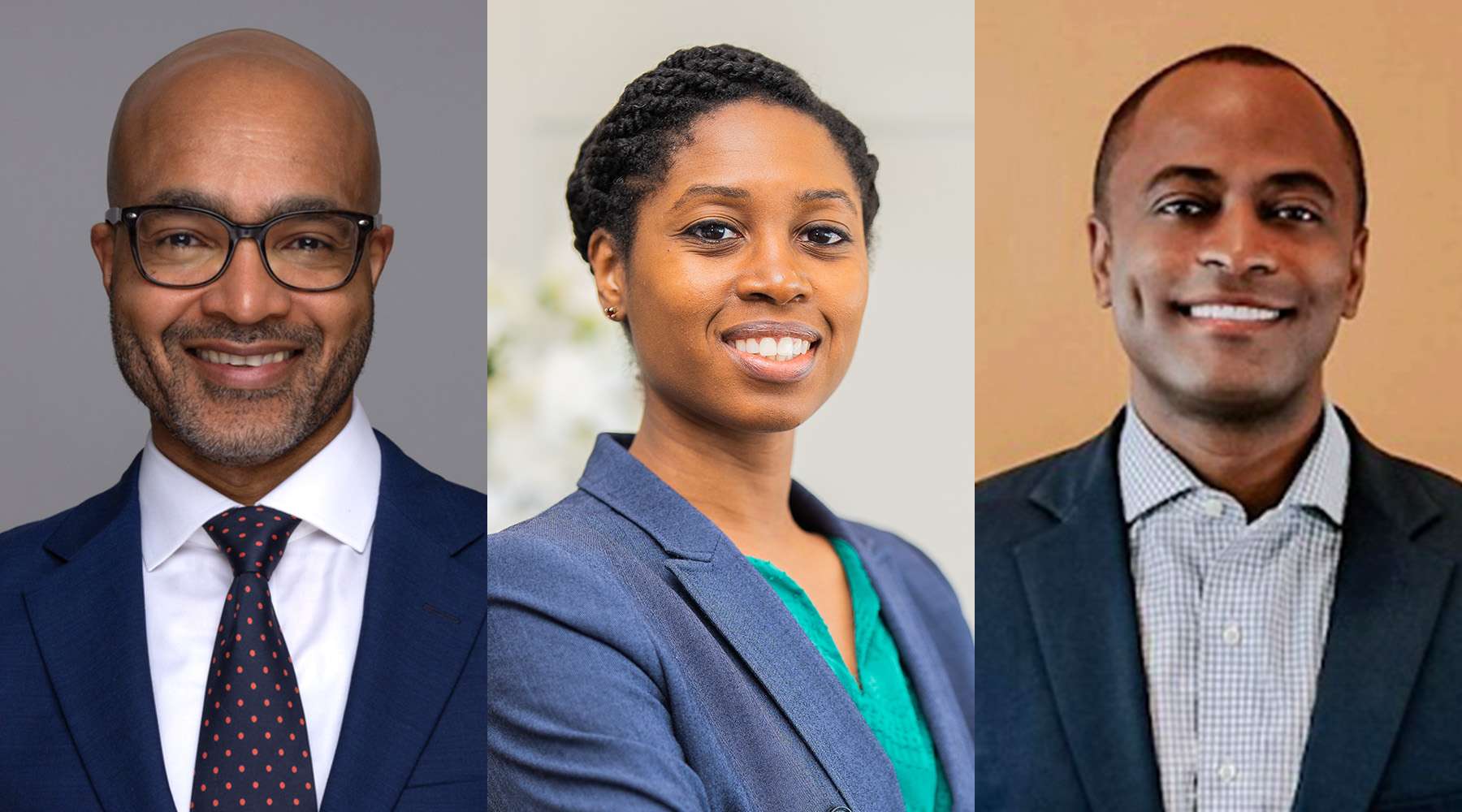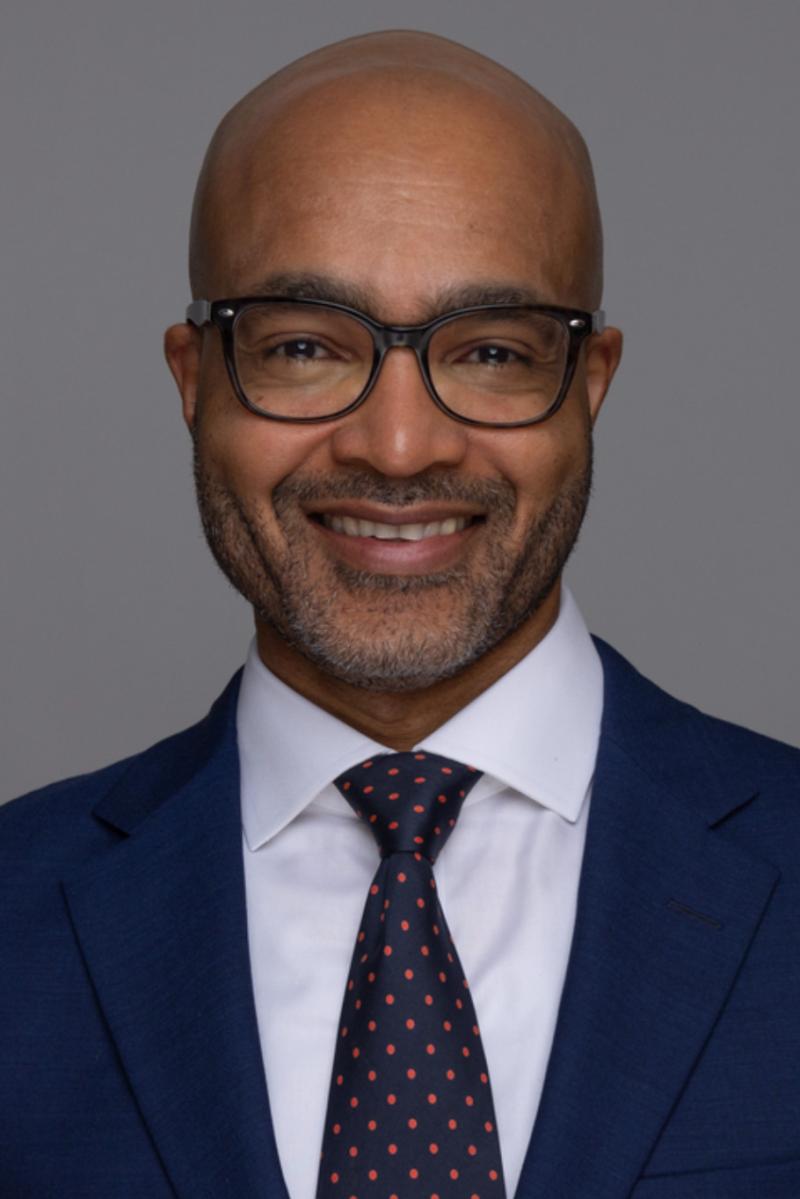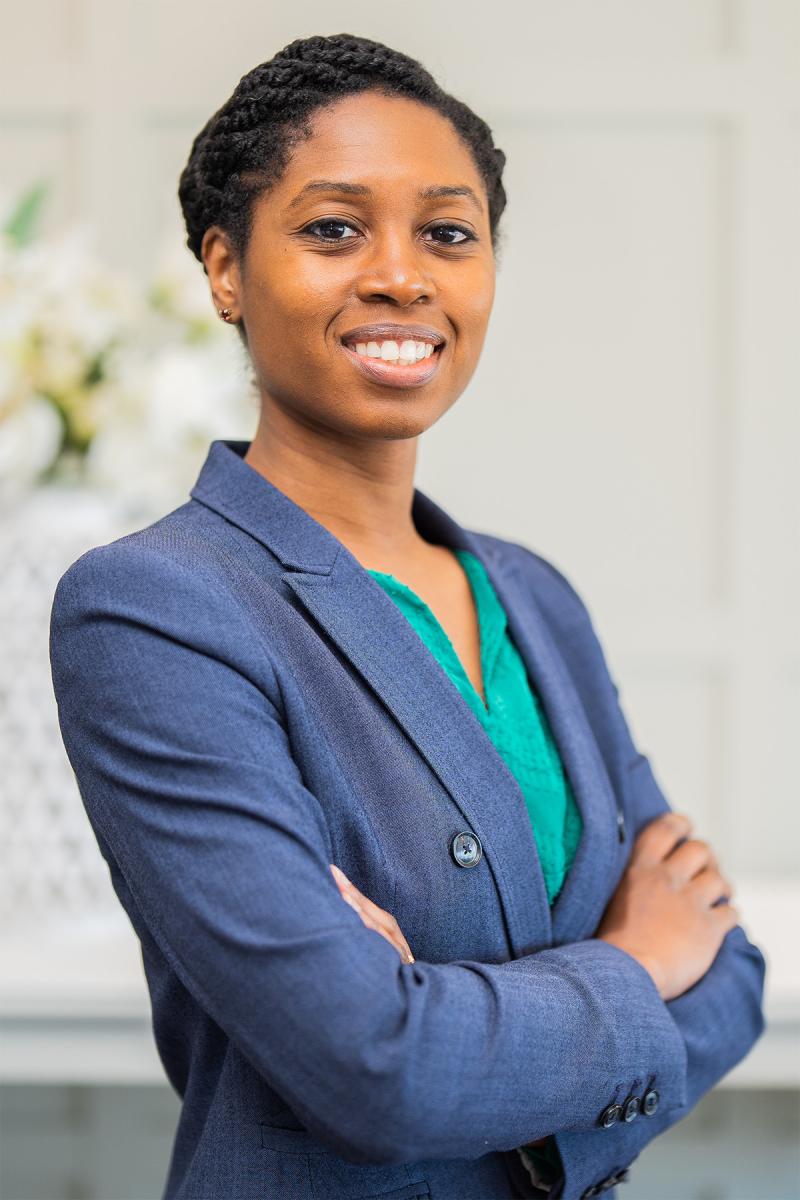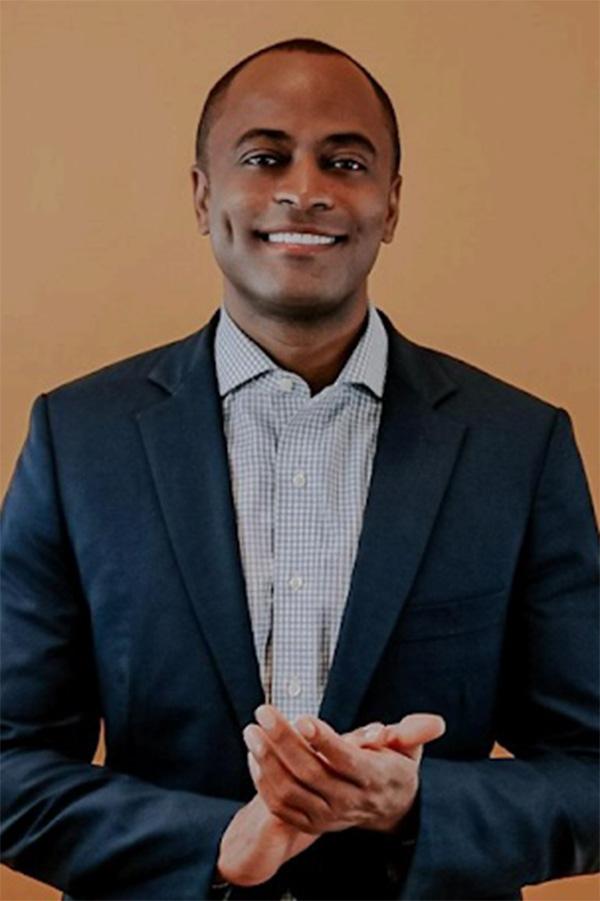
In celebration of 30 years of the Tuck Diversity Conference, we’re recognizing the many journeys and voices through and to the Tuck experience. Meet three former DivCo co-chairs: Barry Bhola T’06, Leah Jack T’21, and Kevin Robinson T’12.

Chief Financial Officer Trumbull Asset Management
What have you been up to since attending Tuck?
After graduation, I moved to Trinidad and Tobago in hopes of starting the first physical commodity trading company in the country, which I achieved in 2014. Along the way, I also developed deep operational knowledge as an implementation and restructuring consultant. I returned to the U.S. in 2018 because it was an ideal time for my son to enter the U.S. school system. Outside of work, I have been an avid trail runner for 10 years and enjoy traveling with my family.
As we celebrate 30 years of the Tuck Diversity Conference, what’s one of your favorite memories from DivCo?
I first attended DivCo as a prospective student. I remember Sally Jaeger introduced herself and asked about the students I had written about in one of my admissions essays. I was blown away that she had taken that level of personal interest in me as a prospective student, and it confirmed that Tuck was where I belonged.
What accomplishments are you most proud of?
Being a dad to my son. Nothing has given me greater joy.
What keeps you busy? How do you like to spend your time outside of work?
In addition to my family and work obligations, I find great joy in mentoring. I currently mentor individuals ranging from college students, including a few current Tuckies, to mid-career professionals. I also enjoy spending time outdoors and traveling.
Describe an ah-ha moment for you—a defining moment that changed the course of your life, career, or altered your way of thinking.
When I immigrated to the U.S., I entered 7th grade without a transcript from my previous school. As a result, my new school assumed I didn’t speak English and placed me in a class with similar students. The next day, I visited the guidance counselor’s office to ask about the placement. Two weeks later, I was moved to the honors class. While I was there, I also received a scholarship application, which led to my acceptance into a New England boarding school. This was a life-changing experience as I am a first-generation college graduate. It took me many years to understand the importance of self-advocacy, particularly in a resource-rich environment like Tuck.
Who do you most admire and look up to? Who inspires you and why?
My mother. She was a single, teenage parent with an entrepreneurial mindset and an unwillingness to accept her situation as permanent. She has fought and overcome bouts with cancer. I have learned a lot from her and have had the fortune to build a deeper bond with her, which has helped me become a better person and father.
What does diversity, equity, and inclusion mean for you today, and in your words, why is it so critical?
Without diversity, equity, and inclusion, we are more likely to be worse off, particularly in the corporate world. The absence of diversity, equity, and inclusion can result in decisions based on suboptimal data and perspectives about our [diverse] target customer base. In a world that is becoming more diverse, neglecting others will eventually lead to a negative marginal return.
What have you recently, read, watched, or listened to that you enjoyed and would highly recommend to others?
Slow Productivity by Cal Newport, Brotopia by Emily Chang, Shoe Dog by Phil Knight, Wildflower by Aurora James, Walk Through Fire by Sheila Johnson, How Big Things Get Done by Bent Flyvbjerg
I hold the position of Chief Financial Officer at Trumbull Asset Management. We specialize in managing private equity-backed merchant power plants across their full life cycle. We are currently constructing a 940 MW combined cycle gas-fired power plant that will be operational in 2026. My career has spanned over 25 years and four continents, primarily in all areas of the energy value chain, with a focus on finance, strategy, and operations.

Project Manager at the Massachusetts Department of Early Education and Care
What have you been up to since attending Tuck?
Since graduating from Tuck in 2021, I have settled down in Western Massachusetts where I have a lovely home and community. My travel was paused for quite some time after the pandemic, but in 2024 I’ve been able to travel to St.Lucia, Peru, and Spain. I’ll also be visiting family in Trinidad and Tobago this coming December. Professionally, I have worked at the local/regional level in a P-12 school district and now work in public policy at the Massachusetts Department of Early Education and Care. It has been a dream to continue my mission-driven career in education, supporting statewide improvements to early education and care with such an ambitious, diverse, and welcoming team.
How would you describe your Tuck MBA experience?
My Tuck experience was eye-opening. It was the most challenging academic experience I have ever had, but I was able to rise to the occasion just as I always have, differentiating myself with project management skills and involvement in organizations like the Center for Business, Government & Society, and the Black Students Association at Tuck.
As we celebrate 30 years of the Tuck Diversity Conference, what’s one of your favorite memories from DivCo?
One of my most prominent memories of DivCo is from when I attended as a prospective student. I remember listening to the keynote speaker Nykia Wright discuss her problem-solving abilities and how this skill led to amazing opportunities in her career. Additionally, before and after the keynote address, I had the chance to speak with Dia Draper about her work at Dartmouth and to connect with current and former students about their experiences at Tuck and their subsequent careers. It was a great introduction to the community I would eventually join.
Describe an ah-ha moment for you—a defining moment that changed the course of your life, career, or altered your way of thinking.
My experience living in England as a teen was the most defining of my life. It solidified my interest in learning about diverse cultures and seeing the world. I was also able to build independence in a relatively safe environment with people like me, who were used to encountering new environments every few years due to their parents’ careers in the military.
Leah Jack spent most of her childhood in Jacksonville, Florida. After graduating from Florida State University, Leah moved to Boston to pursue a career in financial services. She worked at J.P. Morgan for five years before transitioning to a career in education in western Massachusetts. Realizing a desire to build her skills in organizational management, she obtained an MBA from the Tuck School of Business at Dartmouth and returned to education as a school business manager at a regional school district. Financial management in a P-12 setting was rewarding but she ultimately decided to pursue a career in state policy and project management with the Massachusetts Department of Early Education and Care. Leah currently lives in western Massachusetts with her husband and cat.

Founder and CEO of KAYJAY Consulting
What have you been up to since attending Tuck?
After earning my undergraduate degree from Bowdoin College, I began my career on Wall Street with Goldman Sachs. Following my MBA from Tuck, I continued in investment banking. However, my primary goal was to own and manage my own business. So, in 2020, I transitioned from banking to real estate, having purchased my first rental property in 2009.
I acquired 70 rental units during the pandemic and then tripled my portfolio to 150 units. Along with the rental units I own in and around Philadelphia and Harrisburg, PA, my property-management company, KAYJAY Consulting, employs many of my family members. I have been able to not only lift myself out of poverty but also enable many family members to find meaningful and financially rewarding work. Additionally, I have been a speaker for a wide range of colleges and business ventures. My story was featured in several broadcasts, including one from Korea, and in an article and a book by Elijah Anderson, the Sterling Professor of Sociology and African American Studies at Yale. I have also been writing a memoir that will illuminate the process of buying and selling real estate for other young people.
How would you describe your Tuck MBA experience?
When I attended Tuck I already had some business experience as I had been working on Wall Street completing my undergraduate degree. At Tuck, I learned how to leverage my experiences, contacts, and financial stability to make my vision of an independent company a reality.
I already knew that most of the “elite” spaces in both education and business were not diverse, as I had gone from a predominately Black and poor context in Philadelphia to Bowdoin and Wall Street. This was certainly true at Tuck, but while I was there I began to see some inroads in terms of making more opportunities available to people traditionally left out.
As we celebrate 30 years of the Tuck Diversity Conference, what’s one of your favorite memories from DivCo?
The Tuck Diversity Conference included some important thinkers as guest speakers. I found that having opportunities to engage with guest speakers, current Tuck students, and alumni were the most important aspects of the conference. It is important to understand the changes occurring at Tuck in diversity and to recognize the work that still needs to be done. Hearing from everyone who attended and spoke at the conference helped me learn this.
What accomplishments are you most proud of?
At a relatively young age, I was able to fulfill my dream of financial independence. Given the realities of my life growing up with my mother and six siblings, moving from house to house, and never being certain about our financial future, I am proud to have established myself as a real estate investor with an ever-growing portfolio of rental units. Along with this accomplishment, I am most proud that I have been able to have an impact on many members of my family. I helped raise my older sister’s four children after her untimely death, supporting them through their schooling as they grew up. I also have enabled many family members to work with my property management company, helping them to find paths to independence. Most importantly, I believe I surpassed everyone’s expectations and was able to give back to others, helping them achieve success as well.
Describe an ah-ha moment for you—a defining moment that changed the course of your life, career, or altered your way of thinking.
When I was growing up in Philadelphia, my stepfather, Father Charles, was a big dreamer. He and I would take walks in the neighborhood, which had a lot of drug-infested properties and dilapidated buildings. He would always say to me, “You know, this neighborhood is going to get gentrified. Investors are going to turn these abandoned and messed up properties into condos, and restaurants, remodel some of them, and build new properties. Watch, I promise you. You’re going to be surprised.” He was a visionary, even though he wasn’t disciplined in his own life. He would tell me, “You want to be an entrepreneur. You want to be your own boss. You want to buy real estate.” He constantly planted the seed when I was a child, and I acted on it. That’s really where it all started. I started putting it together, saying, “I know it’s possible to do this real estate thing. I’ve seen people do it working on Wall Street on a large scale—how about I do it on a micro-scale and put forth a concerted effort to create something of my own, controlling my destiny?” The best thing a person can do is bet on himself, and that’s what I did.
Who do you most admire and look up to? Who inspires you and why?
I tend to admire other people who have faced challenges. Some have had to deal with circumstances similar to mine, while others have had to address various issues in their lives. I’ve had a relationship with Elijah Anderson, a Yale professor since I was a high school student down the street from the University of Pennsylvania. My relationship with him has continued, and he has featured me in several publications. What I admire about Dr. Anderson is that he has been wildly successful in his field, but he nevertheless devotes much of his time to understanding the community he came from. He attempts to show how disadvantages embedded in our society can hurt people while also exploring how people can achieve the things they dream about. He took the time to mentor me as a young man and now I seek to mentor and inspire young people who are just starting in their adult lives.
Describe a challenge(s) you encountered in your life and/or career, how you were able to overcome it, and what you learned.
I quickly realized that generational wealth was out of reach for my family and our community. This became especially clear when I left the small world of West Philadelphia for Bowdoin College. There, many of the students came from families that, even if not wealthy, had resources to fall back on, such as property, funds, stocks, and other assets.
Because of our financial situation, my family never owned property and moved frequently, which impacted my perspective. As a young person, I realized that this generational wealth often came in the form of property ownership, so I set that as my goal. Along with finding and purchasing my very first properties which I knew would increase in value, when I began to think like a property owner and investor I experienced significant shifts in my mindset, specifically how I see myself and my role in the world. This is one of the things I want to help other young people accomplish.
What does diversity, equity, and inclusion mean for you today, and in your words, why is it so critical?
The historical realities of society have resulted in many people, particularly Black individuals and other minorities, lacking the same advantages and opportunities as others. As a result, many institutions, including educational ones, are predominantly white. This not only disadvantages those who are excluded but also affects the institutions and their members. Imagine the wealth of talent, expertise, knowledge, and experience that individuals like me could bring to these institutions. Moreover, those of us from underrepresented backgrounds often have a strong desire to support others like ourselves, as I have sought to do.
In your opinion, what makes a good leader?
A good leader takes charge and charts a course for others. At the same time, a good leader learns from and about the people with whom he or she works. While a leader must clearly articulate and communicate a vision and pathway, it is equally important to empathize with others’ concerns and struggles. A good leader not only shares their journey transparently but also imparts their knowledge, helping others grow and eventually become leaders themselves.
What have you recently, read, watched, or listened to that you enjoyed and would highly recommend to others?
Recently I read James, a well-received novel by Percival Everett. The book is a retelling of the classic book, Huckleberry Finn, but told from the point of view of Jim, the enslaved man who accompanies Huck on his journey. It’s remarkable because, while respecting the original text, it challenges some of the typical ways in which enslaved people are traditionally portrayed. It explores the language, thought, and interior life of James and other enslaved people in new and exciting ways.
Kevin “KAYR” Robinson grew up with his mother and six siblings on public assistance in Philadelphia, often moving from one place to another. He worked his way out of poverty to a net worth of several million dollars through a mix of ambition, frugality, and education, including an MBA. From an early age, he decided he would become a landlord and business owner. Without anyone in his family to show him the ropes, he spent hours at the University of Pennsylvania bookstore on weekends, reading books about economics, business management, wealth creation, and real estate. Early on his goals included financial independence and early retirement. He considers himself retired as of August 2020, when he left his job in investment banking to focus on his own businesses, including a property management company and a portfolio of 100-plus rental units he owns or co-owns in the Philadelphia and Harrisburg areas.
About DivCo
The Tuck Diversity Conference (DivCo) was founded in 1994 by Tuck alumnus Scott Johnston T’93 as an opportunity for alumni to reconnect. Beginning in 2001, Tuck began welcoming prospective students to the event. This annual tradition now supports Tuck’s efforts to increase representation in all of our programs, and ultimately the world of business. One of the things that makes DivCo special is that like most of our conferences, it is student-led. DivCo co-chairs work together over the course of 6 months to plan, design and deliver a weekend of discussion, networking, mentoring, and socializing that includes faculty, staff, alumni, students, and prospective applicants.